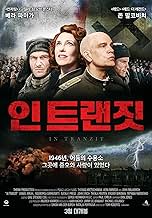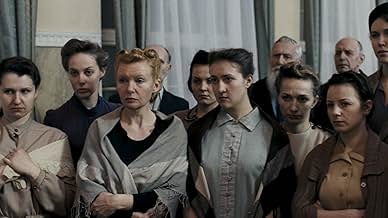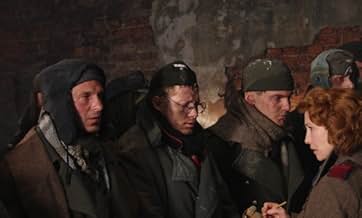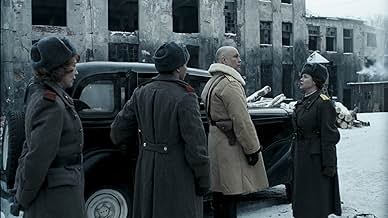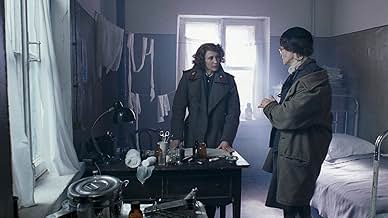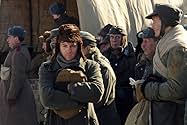VALUTAZIONE IMDb
5,8/10
2855
LA TUA VALUTAZIONE
Dopo la guerra, prigionieri tedeschi vengono trasferiti in un campo sovietico dove incontrano sopravvissute dell'assedio di Leningrado. Le loro vite s'intrecciano in un luogo segnato dalle c... Leggi tuttoDopo la guerra, prigionieri tedeschi vengono trasferiti in un campo sovietico dove incontrano sopravvissute dell'assedio di Leningrado. Le loro vite s'intrecciano in un luogo segnato dalle cicatrici del conflitto.Dopo la guerra, prigionieri tedeschi vengono trasferiti in un campo sovietico dove incontrano sopravvissute dell'assedio di Leningrado. Le loro vite s'intrecciano in un luogo segnato dalle cicatrici del conflitto.
- Regia
- Sceneggiatura
- Star
Sergei Baryshev
- Russian Guard 1
- (as Sergey Baryshev)
Aleksandr Bolshakov
- Captain
- (as Alexander Bolshakov)
Natalya Fisson
- Tamara
- (as Natalia Fisson)
Maksim Gudkov
- Schmidt
- (as Maxim Gudkov)
Recensioni in evidenza
This is supposedly based upon a true story. maybe the part that is true is that the Russians didn't have enough space for all their prisoners, and just dumped four dozen in a lightly staffed women's prison.
Starring Thomas Kretschmann, who managed six roles in 2008 including Wanted and Valkyrie in addition to this one. Also featuring Vera Farmiga (The Departed), who only had four roles in 2008, including The Boy in the Striped Pyjamas. She has a deal with the prison Commandant, played by John Malkovich, to protect her lover from being sent to the front. Also along is Daniel Brühl (Inglourious Basterds, The Bourne Ultimatum, 2 Days in Paris, Joyeux Noël), always a welcome addition.
It was definitely a dark and depressing film, made the more so by the constant snow. There are some SS Officers in the mix and Pavlov (Malkovich) is determined to root them out and hang them. He enlists Natalia (Farmiga) for this task. Malkovich was born for roles like this.
It is strange the the women who hated the prisoners in the beginning for killing their families manage to find forgiveness at the end so they can have sex.
It was the acting, not the script that made this worthwhile.
Starring Thomas Kretschmann, who managed six roles in 2008 including Wanted and Valkyrie in addition to this one. Also featuring Vera Farmiga (The Departed), who only had four roles in 2008, including The Boy in the Striped Pyjamas. She has a deal with the prison Commandant, played by John Malkovich, to protect her lover from being sent to the front. Also along is Daniel Brühl (Inglourious Basterds, The Bourne Ultimatum, 2 Days in Paris, Joyeux Noël), always a welcome addition.
It was definitely a dark and depressing film, made the more so by the constant snow. There are some SS Officers in the mix and Pavlov (Malkovich) is determined to root them out and hang them. He enlists Natalia (Farmiga) for this task. Malkovich was born for roles like this.
It is strange the the women who hated the prisoners in the beginning for killing their families manage to find forgiveness at the end so they can have sex.
It was the acting, not the script that made this worthwhile.
First of all, anyone should watch this movie not because of the plot, but because one needs to learn history from alternative viewpoints.
What is remarkable about this movie, is that it depicts accurately the Soviet policy of killing any prisoner of war by starving, exposure, sentenced execution of simply random killing. One of the dark secrets of the Allies is that they never respected any Geneva conventions and were notorious for committing crimes against humanity.
So some prisoners (the minority) did survive because of luck. There were a few righteous among the nations that helped them with extra food or clothing at a great risk for themselves, so I am glad this movie pays tribute for those compassionate ladies.
What is remarkable about this movie, is that it depicts accurately the Soviet policy of killing any prisoner of war by starving, exposure, sentenced execution of simply random killing. One of the dark secrets of the Allies is that they never respected any Geneva conventions and were notorious for committing crimes against humanity.
So some prisoners (the minority) did survive because of luck. There were a few righteous among the nations that helped them with extra food or clothing at a great risk for themselves, so I am glad this movie pays tribute for those compassionate ladies.
I would like to commend the producers for creating a film with unique concept incomparable to other war movies, because instead of tackling the rampant theme of war, they tackled the post-war situation.
First, in criticizing this film, we don't actually have to deal much about the screen portrayals because the movie does not include heavy drama. However, even if it does not, we still have to appreciate the fact that the actors and actresses really did well in portraying and none of them were over acting. Although, we cannot disavow as well, that there were some who were under acting.
Second, I love the fact that the producers did not frontline script to make a beautiful movie. They made it as realistic as it could be, for it seemed more natural than others.
Third, The musical scoring is on average, but one thing that really depressed me is the playing of violin by one of the prisoners that wasn't synchronized with the video.
Fourth, I was expecting something more on what I can see on the screen -- something like extreme panning of cameras to switch scenes or some amazing CGIs to depict extreme cruelty -- but then everything seemed to be mainstream.
Fifth, the video quality was good. It was not that dark so that we can clearly see what's happening on screen. It was not that light neither that gives a hinge of some historic feeling.
Lastly, The whole 113 minutes was dull. The only variations were the few sexualities which were obviously done to attract and catch viewers. They may use "It's a true story" as an excuse for having no pinnacle scenes other than the sexualities, but I believe it could have been better if they used some cliffhangers to retain, for at least, the interest of the viewers.
Overall, I'd give it a rating of 7 out of 10.
First, in criticizing this film, we don't actually have to deal much about the screen portrayals because the movie does not include heavy drama. However, even if it does not, we still have to appreciate the fact that the actors and actresses really did well in portraying and none of them were over acting. Although, we cannot disavow as well, that there were some who were under acting.
Second, I love the fact that the producers did not frontline script to make a beautiful movie. They made it as realistic as it could be, for it seemed more natural than others.
Third, The musical scoring is on average, but one thing that really depressed me is the playing of violin by one of the prisoners that wasn't synchronized with the video.
Fourth, I was expecting something more on what I can see on the screen -- something like extreme panning of cameras to switch scenes or some amazing CGIs to depict extreme cruelty -- but then everything seemed to be mainstream.
Fifth, the video quality was good. It was not that dark so that we can clearly see what's happening on screen. It was not that light neither that gives a hinge of some historic feeling.
Lastly, The whole 113 minutes was dull. The only variations were the few sexualities which were obviously done to attract and catch viewers. They may use "It's a true story" as an excuse for having no pinnacle scenes other than the sexualities, but I believe it could have been better if they used some cliffhangers to retain, for at least, the interest of the viewers.
Overall, I'd give it a rating of 7 out of 10.
Yikes! Just watched it in Russian. Fortunately I speak enough Russian to understand the voice-over; wish they had kept it in the original English and just added Russian subtitles. Kretschmann, Bruhl, Farmiga and Press all give excellent performances; Evegeny Mironov does the most amazing "silent" performance since his Russian version of Kafka's "Metamorphosis". I have no doubt that anti-German sentiment was running high in 1946 in Leningrad; nevertheless, surely there was some hope or ray of sunshine in all the gloom. I am beginning to understand why this film was not marketed in America. Unless you lived through those times, or are a student of history, the subject matter of this film may not have much appeal. Still, for you history buffs out there, don't miss some fine acting in this film.
IN TRANZIT is one of those forgotten films the viewer wants to love: an all but unknown bit of history based on a true story that offers a different insight into the universal damage inflicted upon all peoples by WW II. The problem with this production is the embarrassingly weak script by Natalia Portonova and Simon van der Borgh, the unfocused direction by Tom Roberts and the bumpy editing by Paul Carlin. Beautifully photographed by Sergei Astakhov in a manner that emphasizes the brutality of Russian winters, setting a perfect matrix for the drama, this film had potential, but even the isolated acting contributions of a few seasoned actors cannot hide the weak script and the annoying pacing.
1946 and a Russian Women's prisoner of war camp lays unused until it is determined by one evil Russian officer Pavlov (John Malkovich) that it will become a camp for German prisoners of war to ferret out occult members of the Nazi SS group that inflicted such agony on the Russians. The camp is run by a group of angry Russian women soldiers and one Russian physician Natalia (Vera Farmiga) who together with Citizen Zina (Natalie Press) represent the humanistic side of the suffering Russian victims of the German brutality. And so it is German men, including the handsome Max (Thomas Kretschmann) who shares a mutual attraction with Natalia and the enigmatic Klaus (Daniel Brühl) among others, versus the Russian women: role reversal and gender dominance changes create the drama. One key mute figure is Andrei (the brilliant Russian actor Yevgeni Mironov), the psychologically damaged husband of Natalia, who in many ways represents the tragedy of the entire WW II on mankind. How these two groups of people interact and survive the conditions imposed on them forms the story.
Though Farmiga and Kretschmann, Press and Mironov overcome the awkward script in an attempt to suffuse this film with palpable tragedy, the result is a bumpy ride through the obvious pitfalls of amateur film-making. It could have been an important film, but is remains a minor though interesting insight as to the extended effects of war on people's psyches. Grady Harp
1946 and a Russian Women's prisoner of war camp lays unused until it is determined by one evil Russian officer Pavlov (John Malkovich) that it will become a camp for German prisoners of war to ferret out occult members of the Nazi SS group that inflicted such agony on the Russians. The camp is run by a group of angry Russian women soldiers and one Russian physician Natalia (Vera Farmiga) who together with Citizen Zina (Natalie Press) represent the humanistic side of the suffering Russian victims of the German brutality. And so it is German men, including the handsome Max (Thomas Kretschmann) who shares a mutual attraction with Natalia and the enigmatic Klaus (Daniel Brühl) among others, versus the Russian women: role reversal and gender dominance changes create the drama. One key mute figure is Andrei (the brilliant Russian actor Yevgeni Mironov), the psychologically damaged husband of Natalia, who in many ways represents the tragedy of the entire WW II on mankind. How these two groups of people interact and survive the conditions imposed on them forms the story.
Though Farmiga and Kretschmann, Press and Mironov overcome the awkward script in an attempt to suffuse this film with palpable tragedy, the result is a bumpy ride through the obvious pitfalls of amateur film-making. It could have been an important film, but is remains a minor though interesting insight as to the extended effects of war on people's psyches. Grady Harp
Lo sapevi?
- QuizThe film was distributed straight to DVD in several countries.
- BlooperWhen Soviet NKVD Colonel Pavlov explains to the German POWs that he's after former SS members hiding among regular German Army soldiers he mentions the war crimes committed by the 8th SS division in the Leningrad area during 1941. Pavlov also mentions the name of Heinrich Lombard, former commanding officer of the 8th SS division (00:27:48). However, the 8th SS division wasn't formed before 1942. During its existence this SS unit never undertook operations in the Leningrad area. Moreover, the 8th SS division, initially named SS Cavalry Brigade and later re-named the 8th SS division "Florian Geyer", never had any commanding officer by the name of Heinrich Lombard. The first commanding officer of the 8th SS division was Gustav Lombard.
I più visti
Accedi per valutare e creare un elenco di titoli salvati per ottenere consigli personalizzati
- How long is In Tranzit?Powered by Alexa
Dettagli
- Tempo di esecuzione1 ora 53 minuti
- Colore
- Mix di suoni
- Proporzioni
- 16 : 9
Contribuisci a questa pagina
Suggerisci una modifica o aggiungi i contenuti mancanti


